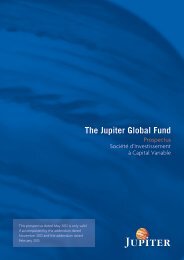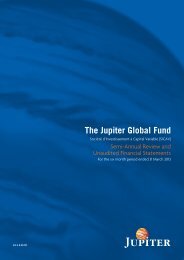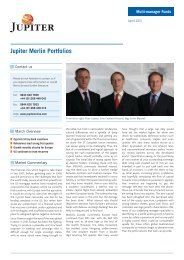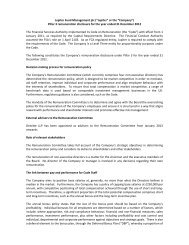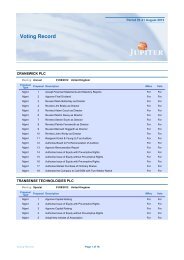The Jupiter Global Fund - Jupiter Asset Management
The Jupiter Global Fund - Jupiter Asset Management
The Jupiter Global Fund - Jupiter Asset Management
Create successful ePaper yourself
Turn your PDF publications into a flip-book with our unique Google optimized e-Paper software.
the jupiter global fund<br />
<strong>Jupiter</strong> Europa<br />
■■<strong>Jupiter</strong> Europa* Review of Portfolio as at 30 September 2012<br />
Performance<br />
NAV 30.09.12 30.09.11 % Change<br />
Class L Euro A Shares EUR 10.53 EUR 9.50 10.84%<br />
Class L Euro B Shares EUR 10.58 EUR 9.59 10.32%<br />
Class L Sterling B Shares GBP 10.74 GBP 9.71 10.61%<br />
Class L US Dollar B Shares USD 10.76 USD 10.00* 7.60%<br />
* Inception date of 2 November 2011<br />
Market Review<br />
In the year under review, the eurozone crisis and slower global growth<br />
continued to dominate market sentiment. Following expectations that<br />
Greece could leave the euro, the European Central Bank (ECB)<br />
stepped in where governments feared to tread and said it would do<br />
whatever was necessary to keep the currency union together. Markets<br />
rallied over the period on this and further quantitative easing from the<br />
US Federal Reserve, the Bank of England and the Bank of Japan.<br />
Despite this, there were periods of heightened volatility and company<br />
results were mixed as China continued to slow and growth elsewhere<br />
such as the US was insufficient to compensate.<br />
Policy Review<br />
As of October 2011, the <strong>Jupiter</strong> Europa Hedge <strong>Fund</strong> Limited was<br />
rolled into the <strong>Fund</strong>, which was subsequently re-named <strong>Jupiter</strong><br />
Europa. <strong>The</strong> weights and some of the names comprising the <strong>Fund</strong>’s<br />
top long holdings shifted accordingly and represent the manager’s<br />
highest conviction selections. Characteristically, these companies<br />
offer some combination of earnings quality, compounding growth,<br />
unique niche positioning, a defensive nature or restructuring potential.<br />
<strong>The</strong> <strong>Fund</strong> began the year with just 20% of the portfolio in long positions.<br />
This reflected the highly uncertain macroeconomic environment and a<br />
window of opportunity for individual stock shorts. However, as the year<br />
progressed, the net position was actively managed in response to the<br />
frequent changes in the outlook, which contributed to performance. In<br />
particular, the flexibility and rapid implementation of index option<br />
strategies meant that adequate protection could be effected without<br />
forced selling of conviction long positions or over-concentration in<br />
individual short stock positions.<br />
On the long side, contributors to the <strong>Fund</strong> this year included some<br />
long-held positions and more recent holdings. In the former category<br />
were: NovoNordisk, Syngenta, Intertek, Azimut and Admiral. <strong>The</strong><br />
single most significant contributor, NovoNordisk, has maintained its<br />
dominant position in the rapidly growing diabetes care market and has<br />
a strong pipeline of ever improving products. In the latter category<br />
were cable operators Ziggo and Kabel Deutschland, residential<br />
property company TAG Immobilien AG and software company<br />
Gemalto. In the case of TAG Immobilien, knowledge of the company<br />
over a long period of time, good communication with management and<br />
solid sector drivers in Germany led to a successful relative over-weight<br />
to this smaller-capitalisation investment.<br />
On the short side, positions established based on our view of their<br />
domestic markets at the beginning of the year in utilities,<br />
telecommunications and the industrial and consumer sectors largely<br />
paid off, though many cyclical shorts ultimately dragged on<br />
performance in absolute terms. Top short contributors included utilities<br />
A2A and Iberdrola and telecoms companies Telefonica and Bouygues.<br />
Several short positions were closed including Nokia, which was taken<br />
on the basis of an untenable business model. However, some short<br />
positions such as Electrolux, despite having in our view a weak<br />
long-term competitive outlook, benefited from significant cyclical<br />
re-rating over the year.<br />
<strong>The</strong> combination of attractive core long positions, shorting opportunities<br />
and responsive management of net positions is reflected in the<br />
performance for the year of 10.3% compared to 0.9% for the<br />
benchmark, the 3-month Euribor.<br />
Investment Outlook<br />
Developments in peripheral Europe’s sovereign debt crisis are likely to<br />
remain the critical factor driving European markets. With the ECB’s<br />
formal backstop and approval of the rescue <strong>Fund</strong> by the German<br />
constitutional court, the building blocks for combating the eurozone<br />
crisis may have already been laid. However, real risks remain. In<br />
particular the backlash against austerity is becoming ever more<br />
strident, possibly limiting further reform efforts and their effectiveness<br />
especially with regard to national bailouts.<br />
Despite the current political and technical difficulties faced by all sides<br />
over the exact terms of bailouts, we expect the next few months to be<br />
a window of opportunity to resolve the issue. In this event, we also<br />
anticipate a positive market reaction, possibly sustained by investors<br />
that have remained on the side-lines so far. Greece’s enormous debt,<br />
collapsing economy and political instability could reignite fears of euro<br />
exit, but near-term we expect concessions and trade-offs to maintain<br />
the unstable status-quo.<br />
Growth prospects are a concern for equities, which have proved<br />
resilient overall so far. Given that improvements in credit, sentiment<br />
and demand will lag our assumed structural improvements, the extent<br />
to which companies are affected so far could begin to manifest itself in<br />
the latest company results.<br />
Stephen Pearson and Michael Buhl-Nielsen<br />
30 October 2012<br />
*As at 18 October 2011, the name of the <strong>Fund</strong> was changed from <strong>Jupiter</strong><br />
European Absolute Return to <strong>Jupiter</strong> Europa.<br />
78



